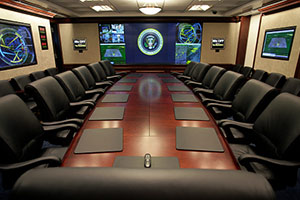The U.S. Needs New Theories for National Security Success

Every major American national security victory began with a theory for success. Those theories were used to build strategies, which were then executed through operations and tactics. Success always begins with a theory, and you cannot achieve success in national security without first starting with a theory.
For example, President Lincoln developed a theory for defeating the Confederacy in the early days of the Civil War based, in part, on General Winfield Scott’s plan to blockade the South by controlling the nation’s coasts and waterways. The influence of Scott’s 1861 Anaconda Plan contributed to the North’s overall strategic initiatives throughout the war, which led to the Union’s victory in four years.
President Franklin D. Roosevelt, British Prime Minister Winston Churchill, and their chiefs of staff constructed a theory for victory in World War II over a three-week period around Christmas of 1941, just weeks after the United States had formally entered the war. The Allies achieved victory in Europe and Japan in the spring and summer of 1945, respectively.
The National Security Council outlined a theory of Soviet containment in a 1950 paper called NSC-68, which President Harry Truman used to initiate a long-term strategy of alliances. Forty-one years later, the Soviet Union collapsed – just as the Security Council’s theory suggested it would.
Now, look at today.
Sixteen years after the terrorist attacks of September 11, 2001, the United States is not winning the war on terrorism – or many of the other major national security challenges we face.
Consider:
- Islamic supremacism is more powerful today as a transnational movement than it was on September 11, 2001.
- The Taliban is still in Afghanistan and the Khyber Pakhtunkhwa province in Pakistan.
- The Iranian dictatorship is steadily growing in power and influence.
- North Korea’s nuclear weapon and missile program is proceeding at an accelerating rate.
- We are unable to respond effectively to Russia’s system of hybrid warfare, which utilizes political pressure, propaganda, and fluctuating violence to achieve warlike outcomes, while avoiding full war.
- Cyber and intellectual property theft by China have been debilitating our nation for at least a decade.
The list goes on and on.
This ineffectiveness in the face of aggression is not due to a lack of resources or willpower. Instead, it is largely because we lack appropriate theories for success for national security.
Without the right theories, we cannot develop sustainable and executable strategies that will lead us to victory.
While America meanders aimlessly on the world stage, reacting to one crisis after another, our competitors are taking advantage.
The Chinese and Russian regimes work every day to dominate us through economic development, alliance building, technological advancement, and long-term investments that have the potential to strengthen their military capabilities. This is all part of an ongoing competitive engagement that looks nothing like the wars we have fought in the past – but remains no less threatening to our survival.
Further, our theory gap creates more deadly challenges. Since we are failing to keep nuclear weapons away from places such as North Korea, Iran, and Pakistan, we must also develop a doctrine for minimizing American casualties during a potential nuclear war.
So, what can we do?
We must renew the basis of American power. This requires developing a national security theory of succeeding in education and the economy. It also requires assessing the national security implications of public health crises, like the opioid crisis.
A unhealthy, uneducated, and unproductive America will not sustain a global national security system and may not even be able to defend itself.
Specifically, to be successful over the next 20 years, we must develop national security theories for:
- Shrinking and eventually eliminating Islamic supremacism as an ideology capable of recruiting soldiers willing to engage in terrorism.
- Creating an American response to the Russian model of hybrid warfare which operates with the same capabilities.
- Developing systems, strategies, and structures for sustaining continuous competition with China and Russia.
- Being prepared for constant change across every career, institution, and system brought about by emerging technologies.
- Constantly communicating with Americans and allies to help people understand that mastering the scale and pace of change will be the key to success.
This is a daunting agenda, but it is historically and realistically the right agenda.
Anything less will increase the risk of America’s defeat within the next generation.
Your Friend,
Newt
http://gingrichproductions.us5.list-manage1.com/track/click?u=3872bad904308135ca41de823&id=59ddb99533&e=7942c071bd